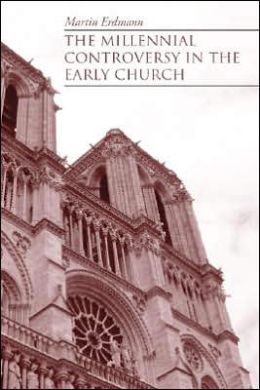Martin Erdmann: The Millennial Controversy in the Early Church
 Martin Erdmann, The Millennial Controversy in the Early Church (Eugene, OR: Wipf and Stock Publishers, 2005), 228 pages.
Martin Erdmann, The Millennial Controversy in the Early Church (Eugene, OR: Wipf and Stock Publishers, 2005), 228 pages.
Martin Erdmann’s text is a worthy contribution to the study of biblical and patristic eschatology (doctrine of the Last Things). With an educational background in both church history and New Testament, Erdmann utilizes all of his academic skills in investigating the reasons for and consequences of the shift from premillennialism to amillennialism in the patristic era of the church. His thesis is that this shift, however understandable, had negative consequences and flew in the face of apostolic tradition and proper exegesis of Scripture.
Erdmann begins by assessing the primary source of Christian millenarianism, namely Jewish apocalyptic. He discusses various works and condenses their purpose and message, and their collective bearing and influence upon the biblical book of Revelation. This introduces the second chapter, which begins with a survey of millennial options: postmillennialism, which sees the earthly millennium as preceding the return of Christ; amillennialism, which spiritualizes the millennium and usually designates it as the current time of the church; and premillennialism, which sees the earthly millennium as commencing immediately after the return of Christ to earth. Premillennialism is further sub-divided into historic premillennialism, reflective of the traditional premillennial perspective, and dispensational premillennialism, the more recent (1830’s AD) addition to premillennial thought containing the distinctive doctrine of the secret pretribulational rapture of the church as the first of a two-part second advent of Christ and the sharp exegetical division between national Israel and the church. The second part of this chapter is an exegesis of Revelation 20:1-10, the flagship text of millennialism of any kind. Erdmann argues fairly persuasively for a premillennial position, without designating either the historical or dispensational variety.
Chapter three offers an overview of the hermeneutical principles employed by the early church fathers, those Christian leaders immediately following the apostles. The fathers read the Scriptures through a Christological lens, seeing all of Scripture as pointing to Christ and therefore interpreted rightly only through him. They held to the necessity of the work of the Holy Spirit in interpretation, and they recognized both the literal interpretation and deeper spiritual meanings of the sacred texts, with the latter being reined in from speculation by the former.
Erdmann spends the next several chapters contrasting two different hermeneutical schools in the early church, those of Antioch and Alexandria. The Antiochene school preferred a literal interpretation of Scripture wherever possible while the Alexandrian school opted for the allegorical approach. Erdmann argues for the superiority of the literal approach and shows how the Antiochene school was rigorously premillennial. He cites Justin Martyr and the author of the Epistle of Barnabas, among others, as demonstrating this “Asiatic” premillennial tradition, and defends the view that this is the school of thought which stems from the Apostle John, the traditional author of Revelation. It was the Alexandrians, Erdmann argues, under the leadership of Clement and especially Origen, which allegorized Scripture and thus advocated an amillennial perspective over against the premillennialism of the early church. It was Augustine, Erdmann rightly contends, that solidified this amillennial perspective in the church and, respected teacher that he was, sounded the death knell for premillennial thought in the church for over a thousand years.
Category: Church History, Winter 2007


